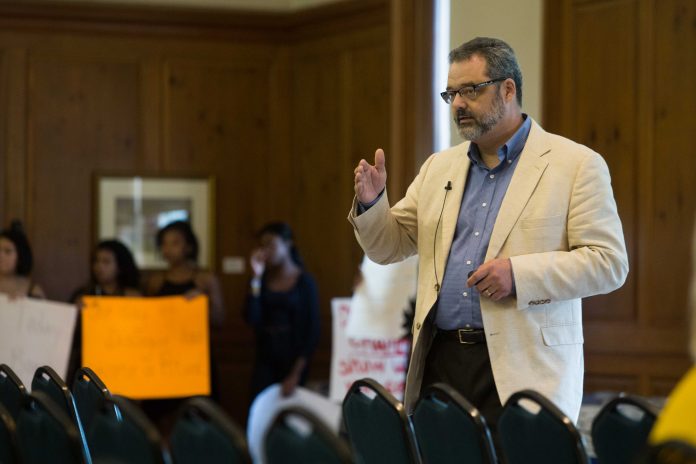
Faculty met this Tuesday in a closed executive session to further discuss its vote of no confidence in President Mark McCoy. Voting will take place on e-Services and is available to all voting members of the faculty from 8 a.m. on Wednesday, Nov. 14 until 9 a.m. on Monday, Nov. 19.
“A vote of no confidence means the faculty has reached the point where it thinks the state of the University has reached a point where stewardship requires the removal of the president,” said History Professor Glen Kuecker. “That means faculty think the president represents an existential threat to the short and long-term stewardship of the University.”
In regard to whether the vote of no confidence will pass, Kuecker said, “It is hard to estimate if it will pass.” He explained that there was a letter circulating around on Tuesday, Nov. 13, calling for faculty to abstain from the vote. The concerned faculty’s position is that they have no confidence and agree with the rationale in the no-confidence motion, but they believe a "yes" vote would do more harm than good. See page 8 of The DePauw for the text of that letter.
“In my view, that means an abstain vote is paramount to a no-confidence vote, but one can hope that the president can get things going in the right direction,” said Kuecker. "I do not think there will be more than about 20 to 30 ‘no’ votes. I think the ‘abstain’ (votes) will probably beat the ‘yes’ (votes), but not by much. Either way, it will be a firm statement of no confidence when the abstains and no confidences are taken together.”
Ultimately, the Board of Trustees controls the hiring and firing of the president.
In response to the faculty vote of no confidence, the Executive Committee of the Board of Trustees sent a message on Tuesday that was shared with members of the faculty email list. That list includes all voting and nonvoting faculty and some other members of the community. The letter was shared with The DePauw by Howard Brooks, faculty chair.
The letter said, “We support Dr. McCoy and his efforts to lead the institution toward a financially sustainable position within the dramatically changing higher education landscape. We believe he has the best long-term interests of DePauw at the core of his work.”
The letter went on to say that the Board of Trustees appreciates the right of the faculty to voice their concerns about the actions of the president, administration, and trustees.
“We believe, however, a vote of no confidence in Dr. McCoy is unwarranted, ill-timed, and could derail the very recent advancements to improve governance and communication between the faculty and trustees. Additionally, it could have far-reaching adverse consequences for the entire DePauw community on enrollment, campus climate, the university’s finances, fundraising, and alumni relations,” the letter said.
In the letter, the Board of Trustees also announced plans for an on-campus forum which will include a representative group of faculty, administration, and trustees “to continue the dialogue on creating a better DePauw.”
The goal of the forum is to better understand the faculty’s concerns, address the University’s challenges, and improve communication between the faculty and trustees, the letter read. The letter did not give a date for when this forum would be held.
Professor of Classical Studies Rebecca Schindler said that efforts to improve communication between faculty and the Board of Trustees are a “good sign.” “We need to work together to find solutions to the challenges we are facing,” Schindler said in an email interview.
As for the potential impact of the vote of no confidence on DePauw students, Kuecker said, “Students need to know that faculty care greatly for the students and our commitment is to what happens in and out of the classroom. While the question of no confidence may distract from teaching, we face a situation where a no confidence motion means we think the president's management of the University has caused an even greater distraction.”

